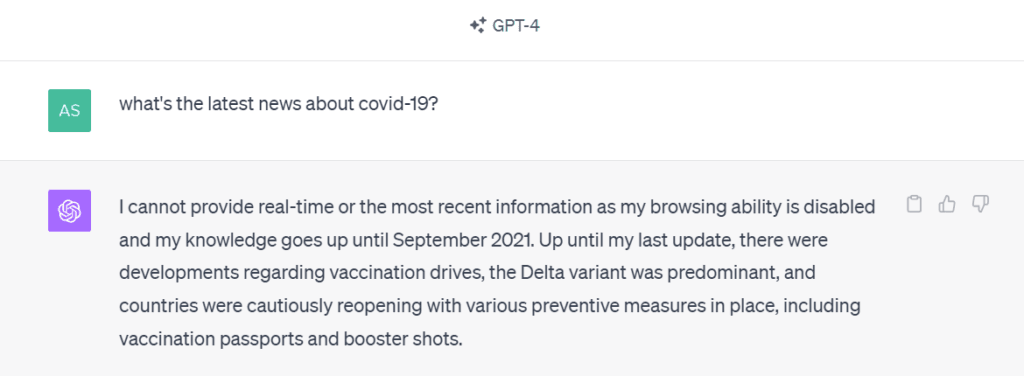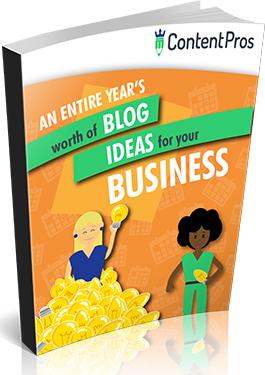Artificial intelligence (AI) has emerged as a powerful tool with immense potential in content creation. With its ability to synthesize vast amounts of data, optimize content for search, and even help with writing articles, businesses and content creators alike are eager to push AI to its limits and see what’s possible. But while AI might be stealing the lion’s share of the spotlight for now, it’s worth reminding that it’s not a substitute for trusted human experts.
Just like any technology, AI has its limits. The more we see AI being used in content creation, the more obvious those limits become. Here are eight things that humans at content writing agencies undoubtedly do better than AI:
1. Content Agencies Generate New Ideas
Content Pros offers full-service content writing services, including helping our clients come up with topics for their content marketing. From using data-driven tools to see what people are currently talking about to sharing personal experiences and case studies, agencies can provide a wealth of ideas for your marketing strategy.
ChatGPT, one of the biggest names in AI content creation, was trained on the largest dataset of its kind, and that training was conducted several years ago. Case in point: ChatGPT “thinks” the pandemic is still happening, using phrases like the “ongoing pandemic” and “new normal” when writing about Covid-19.

Without constant updates, the “knowledge” of ChatGPT is limited and does not reflect current events and new information.
The Takeaway: Fresh ideas are essential to maintain rankings and relevance. While AI tools can help to inspire basic ideas, they don’t support newsworthy or unique topics.
2. AI Needs Editing — Lots of Editing — To Meet Your Brand Guidelines
AI content tools like ChatGPT do a decent job of correct spelling and grammar. But the text it develops isn’t perfect or customized for your brand.
Our clients have spent a lot of time developing an authoritative brand with a unique voice and a targeted SEO strategy. It can take more time to tweak AI-written content to suit these objectives than to have a professional writer who’s familiar with their strategy write the content.
Here’s a basic example of content marketing using ChatGPT:
“Content marketing is an indispensable strategy in today’s digital landscape, and its significance cannot be overstated. It serves as a powerful tool for businesses to engage, educate, and build meaningful relationships with their target audience. By creating valuable and relevant content, companies can establish themselves as industry thought leaders, fostering trust and credibility among their customers.”
It’s factually correct, but it sounds dry, basic, and not relevant to any one brand.
A fun, more upbeat version might sound like this:
“Unsure how to market to your customers? Connect with content! Content marketing gives you an “in” to your audience’s inner circles by educating, entertaining, and building meaningful relationships.”
AI gave us the basic structure in the first example, but the second example took some fine-tuning to add the right style and tone.
What’s more, many AI tools embed watermarks within the content that can be detected by search engines. This helps Google and other search engines differentiate what content has been written by humans and what’s computer generated, which might negatively impact your rankings.
Content agencies have the benefit of knowing your brand, voice, and writing style and can create content that resonates more efficiently than AI tools. If you have AI-generated outlines or a rough draft, we’re also happy to do challenge reads and edit existing content on your behalf so the final product aligns with your business image.
The Takeaway: AI in content creation doesn’t apply to every use case. Skipping the AI step altogether in the example above could have saved time without sacrificing the outcome.
3. Content Agencies Fact-Check Information
Content writers don’t make up facts and stats on the spot. Rather, they’re searching for relevant stats and figures from trustworthy sources.
AI occasionally cites a stat but doesn’t link to its location. As a result, you’ll need to spend time fact-checking the stat before you publish. In some cases, you might find that the stat came from a competitor (which you don’t want to link to). Or, you might struggle to find it at all.
The Takeaway: Using AI can send you down unnecessary rabbit holes that can be avoided by using a professional writer with solid research processes.
4. AI Cannot Create Opinions
Unique data or “hot takes” are a big part of what makes content pop. Companies and experts need to share original thoughts and opinions, not just rehash what everyone else is saying. Content marketing is a crowded space, so the last thing you need is more of the same.
With a team of industry-specific writers, our clients tap into the writer’s expertise and knowledge of current trends, events, and news to help them shape their content ideas. From there, our writers add the client’s unique take on these ideas to help their content stand out and offer the reader something more than what’s already been written about a topic.
The same cannot be said of AI.
AI is not capable of knowing your unique take on a topic and will instead spit out generic information that readers could get somewhere else.
The Takeaway: Originality is key, and that’s not AI’s strong suit. A content agency can help you transform your thoughts and ideas into unique content by using your notes and real-life experiences, hosting brainstorming calls, and asking questions.
5. Content Agencies Link to Reputable Sources
Along the same line as fact-checking information, content agencies can add links to your content to back up claims and make your content more authoritative. Adding external links can also boost SEO value, as algorithms see links as a source of authority.
When AI tools do cite sources, they do not provide links to those sources. This means that even if you generate a great paragraph using AI, you can’t simply copy and paste it. You’ll still need to edit the text and add any relevant links to polish and complete your content. The same goes for adding images and videos, proofreading the content, and formatting it for visual interest.
The Takeaway: AI isn’t a copy/paste solution. Content agencies like Content Pros will go through the whole SEO checklist to make sure your content is ready for publishing when you receive it, including the addition of internal and external links.
6. AI Isn’t (Intentionally) Funny
Puns, jokes, and industry-specific references can add color to content and make it unique. But since AI isn’t human, it doesn’t have a single funny bone in its code. At least, not on purpose.
Humor is contextual and situational. That’s part of what makes it work so well. Even though AI has been trained to crack jokes, they rarely make sense in the context of whatever you’re writing.
Here’s what ChatGPT said when we asked for a joke about content marketing:

Yes, puns have their place in content marketing. But the joke just isn’t there.
The Takeaway: For brands that rely on humorous references in their content, a human writer is a better option because they can connect feelings with situations in ways that make sense.
7. Content Agencies Write Like Humans, Not Robots
AI might have the mechanics of putting words together but it lacks the dynamics that make it worth reading. The opposite is true of content agencies, which are driven by humans.
Humans don’t write in patterns or formulas. Instead, we use emotion, real-world knowledge, stories, and facts to shape our content. AI doesn’t have these things because it isn’t human, which means it has to rely on patterns and formulas to string words together.
The Takeaway: Content is made for humans, so it should be made by humans — at least in large part.
8. AI Doesn’t Know Your Story
Your content gives you a platform to tell your story, not just share general information. But AI doesn’t have the benefit of knowing your story like another human does.
Instead, AI delivers what it’s already seen. This might not align with your perspective or audience, might be incorrect or incomplete, or even include unintended bias.
The Takeaway: There’s no one better to tell your story than YOU. And if you’re short on time or don’t have a way with words, a content agency can collect your ideas and turn them into expertly written content.
Can Agencies and AI Live in Harmony?
Artificial intelligence is undeniably reshaping the content creation landscape. But it can’t truly replace the creativity and expertise a dedicated content agency brings.
In its current state, AI can be valuable in certain use cases, such as creating content outlines, optimizing existing content for search engines, and generating basic run-of-the-mill content at a low price. But for expertly written content that goes beyond the basics and requires originality, human writers are the best (and only) option.
At Content Pros, we’re continuing to evaluate the latest versions of AI software to determine where it makes sense to utilize AI-produced content and services. We’re also maintaining the human element of quality content writing with a dedicated team of writers who are experts in their respective industries. Let us put our skills and expertise to work for you — get $100 off your first article now.

